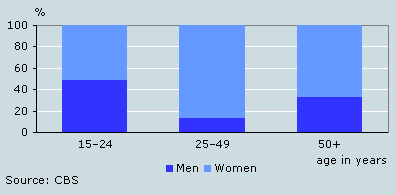People active in short-hour jobs are mainly young

In 2006, just over 900 thousand people aged 15 years and older were active in short-hour jobs. They are predominantly young pupils and students working in part-time jobs.
More young people work short hours
Last year, 490 thousand people in the 15–24 age bracket working part-time. They made up over half of part-timers. One in three 15 to 19-year-olds and one in seven 20 to 24-year-olds were engaged in small, part-time jobs. Over the past decade, the number of young part-timers increased by one third.
Labour market position, 2006

Pupils and students active in short-hour jobs
Young people working in small, part-time jobs are almost invariably pupils or students. They work in the trade sector and in hotels and restaurants, etc. They are also often engaged in leaflet and newspaper distribution or work in cleaning jobs. Young people often work irregular hours allowing them to combine studies with paid work.
The ten most popular small jobs among 15 to24-year-olds, 2006

Women with care-giving responsibilities usually work short hours
Most part-time workers aged between 25 and 49 are women combining their job with care-giving responsibilities. More than half of them prefer jobs of no more than 12 hours a week. The main reason is that women in this age category have to look after the children and do household chores.
Over the past decade, the number of 25 to 49-year-old female part-timers dropped to 194 thousand. In the same period the number of female full-timers increased sharply to more than 2 million (2006).
Share of men and women working short hours, 2006

Older people working short hours often self-employed
Among over-50s, most people working short hours are also women. From the age of 65 onwards, male part-timers outnumber their female counterparts. Most of them are self-employed.
Saskia te Riele and Ingrid Beckers